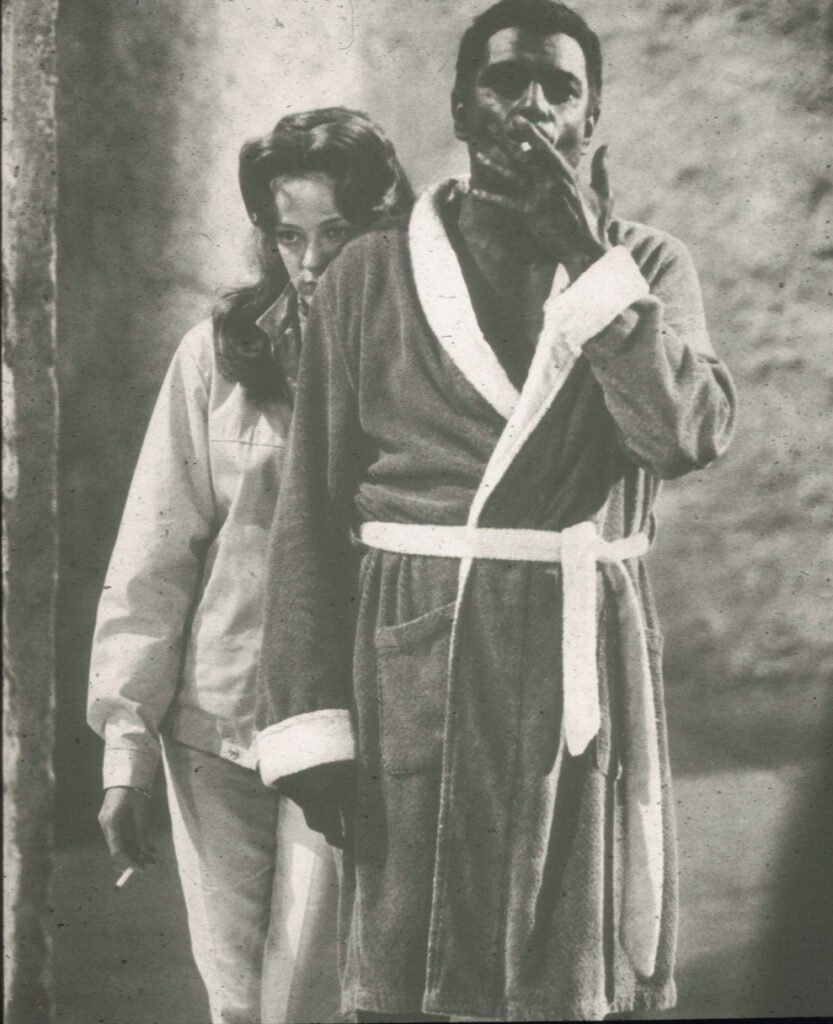
The Masks of Othello: A Theatrical Essay traces the evolution of Shakespeare’s The Moor of Venice from a character portrayed by white actors assuming masks of blackness to a role that has become the exclusive property of the black actor. In this play, the play The Tragedy of Othello is itself the central character as we followed it through the ages in the performances of some of the greatest actors throughout time. From Burbage in the Elizabethan era, Betterton in the Aldridge and Edwin Booth in the 19th Century and Paul Robson and Laurence Olivier in the 20th Century. And then there are the critics through the ages who struggle mightily to make the play conform to the values and customs of their times. Who is Othello? Is his visage in the color of his skin or is it in our minds?
Cast & Crew
first presented at the Playwrights’ Center in 2012
Written and directed by Carlyle Brown
Cast
James Austin Williams as Black Othello
Christopher Gabriel as White Othello
Gwendolyn Schwinke as Desdemona
Brent Doyle as Iago
Tom Sherohman as Critic #1
Nancy Marvy as Critic #2
Designers
Lighting design by Mike Wangen
Set design by Karen Gundersen
Press
Was Shakespeare a precursor of multiculturalism?
by Graydon Royce of the Star Tribune
Playwright and director Carlyle Brown constructs a vigorous, intelligent meditation on Shakespeare, theater, race and society in “The Masks of Othello: A Theatrical Essay.” The piece, which opened Thursday at the Playwrights’ Center in Minneapolis, traces the evolution of the Moor of Venice from a character portrayed by white actors under ambiguous masks to a role that has become the property of African-Americans.
The Elizabethan imagination, Brown notes in his program, “lumped all people south of the Mediterranean into one black and godless tribe.” So just whom did Shakespeare have in mind when he created this character and suffered the vilification of critics? For that matter, what did Othello do to audience expectations and reactions?
Brown essentially takes a chronological look at the actors who performed the role, white and black, starting with Richard Burbage and running up through the 20th-century portrayals by Paul Robeson, Laurence Olivier and James Earl Jones.
Juxtaposed are reactions to the performance from two black-clad actors who represent critics through the ages.
As a theatrical event, the piece drifts along as an interesting frolic until actor James A. Williams takes the stage as Ira Aldridge, the first black Othello in the 19th century. Simply by who he is and what he represents, Williams transforms the intellectual response to visceral reaction. The power and authenticity of his portrayal prick the question of colorblind casting and challenge our racial attitudes. Why does he seem so powerful? Is it simply the actor? Or the color of his skin, the tone of his voice? Or does he conjure within our psyche centuries of lore and suppositions? Whatever the answer, Brown’s essay assumes fresh legs at this point. This question persists as one of the critics – reacting to Robeson’s Othello – states, “The Negro is absolutely essential for the full meaning of the play.”
First-rate actors bring Brown’s work to life. In addition to Williams’ potent and regal bearing, Christopher Gabriel portrays the white Othellos with Shakespearean brio and energy. Gwendolyn Schwinke shows a delicate modulation as Desdemona. And Brent Doyle shares his classic face and two eyes that seem at once to be soulful and soulless as Shakespeare and Iago. Tom Sherohman and Nancy Marvy are the critics – more mouthpieces than full characters, yet both manage to make their arguments interesting and illuminating.
Resources
The Masks of Othello Source Material
The Masks of Othello includes material from William Shakespeare’s The Tragedy of Othello, Titus Androncus, The Merchant of Venice, Hamlet, Love’s Labors Lost, and The Tempest.
Material in this play has been sampled from the following sources:
- The Masks of Othello by Marvin Rosenburg
- A Contextual History by Virginia Mason Vaughan
- Tudor Royal Proclamations
- Hecatommithi by Cinthio
- A Short View of Tragedie by Thomas Rymer
- The Rules of Civility… Antoine de Courtin
- Works by Aphra Behn
- A Cosmopolitan Actor by David Garrick and Frank Hedgcock
- Original Letters by Benjamin Victor
- The Thespiad 1809
- Reminiscences by W.C. Macready
- The Theatrical Review 1757
- The Public Advertiser October 29, 1787
- The monthly Mirror 1808
- Actors Black and Tawny in the role of Othello by Ruth Cowhig
- Dramatic Essays (London 1894)
- The Reflector 1811
- Ira Aldridge by Herbert Marshall and Mildred Stock
- The Story of My Life by Ellen Terry
- Actors on Acting, edited by Toby Cole and Helen Kirch Chinoy
- Shakespeare In Sable by Errol Hill
- The Shakespearean Scene by Herbert Farjeon
- Shakespeare Survey Vol 21, ed. Kenneth Muir
- Aspects of Othello, ed. Kenneth Muir
Music: Othello, Op. 93 by Antonin Dvorak
